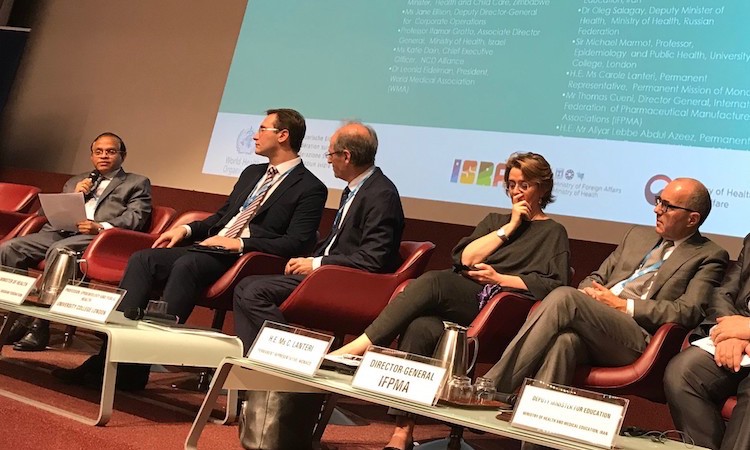Sri Lanka Co-Chaired Meeting Focuses on Diseases Killing the Poor
By Jamshed Baruah
GENEVA (IDN) – Noncommunicable diseases (NCDs) pose a serious global development challenge. As the year three of the implementation of the 2030 Agenda for Sustainable Development and 17 Sustainable Development Goals (SDGs) comes to a close, evidence shows that the international community is not on track to meet a vital goal. This is a disconcerting perspective because NCDs are causing far more deaths and disability than any other group of diseases, according to experts.
Seven in 10 people worldwide die every year from cardiovascular diseases, cancer, chronic obstructive lung disease, diabetes and mental health because of tobacco use, harmful use of alcohol, unhealthy diets and physical inactivity, as well as air pollution.
While Goal 3 pledges to “ensure healthy lives and promote well-being for all at all ages”, in Target 4 the international community vowed by 2030 to “reduce by one third premature mortality from non-communicable diseases through prevention and treatment and promote mental health and well-being”.
The warning that there is a danger of failing to miss Goal 3.4 emerged from the two-day General Meeting of the World Health Organization (WHO) Coordination Mechanism on the Prevention and Control of Noncommunicable Diseases (GCM/NCD).
Hosted by the Government of Switzerland and co-chaired by Ambassador Abdul Azeez, Sri Lanka’s Permanent Representative to the United Nations in Geneva, the meeting brought together more than 300 Participants and 90 Member States. UN Agencies, funds, programmes and organizations, as well as non-State actors such as NGOs, academic institutions, philanthropic foundations and business associations also participated.
The General Meeting built on the outcomes of the UN General Assembly Third High-level Meeting on the Prevention and Control of NCDs (UNGA HLM3) on September 27, 2018, providing different stakeholder perspectives on how to facilitate the implementation of the high-level commitments and the WHO Thirteenth Global Programme of Work (GPW13).
Under the co-chairmanship of Ambassador Azeez, the Meeting facilitated interactions between stakeholders at policy and political levels, on enhancing the effective coordination of activities aimed at prevention and control of NCDs, which are causing 41 million deaths annually. Of these, 15 million are women and men between the ages of 30 and 69 years.
Ambassador Azeez drew attention to the fact that more than 85 percent of these premature deaths take place in low- and middle-income countries, negatively affecting macroeconomic productivity, national growth, healthcare costs and household incomes.
The meeting concluded on November 6 with a statement by Switzerland and Sri Lanka’s Ambassador Azeez, which accentuated that “with a re-invigorated mix of high-level political commitment and multidisciplinary, coordinated and coherent multisectoral and multi-stakeholder approaches, the NCD challenge can be overcome.” In fact, when we look towards concrete solutions, “the picture is not all bleak”, noted the statement.
The statement adds: Accumulating evidence indicates that an additional US$1.27 per person per year in low- and lower-middle-income countries will save 8.2 million lives, achieve a 15 percent reduction in premature mortality from NCDs and generate US$350 billion in economic growth by 2030, through the implementation of cost-effective and high-impact interventions.
“The accelerated implementation and scale-up of these interventions can curtail the destructive path of NCDs but will require our collaborative, concerted and consistent efforts,” declare the co-chairs.
Participants of the General Meeting welcomed the successful first four years of the WHO Global Coordination Mechanism on NCDs. The co-chairs statement notes that this innovative multisectoral and multi-stakeholder engagement platform has facilitated bridging the last two high-level meetings of the UN General Assembly on NCDs between 2014 and 2018.
It has done so by supporting the evolution of the NCD narrative from a disease-focused perspective to a multi-stakeholder and cross-sectoral health and development perspective that better aligns with the SDG-era. The GCM/NCD has supported this transformative change by convening and connecting Member States, UN agencies and non-State actors, stresses the statement.
This, according to the statement, has been realised through global policy dialogue meetings, expert working groups that support governments, address pending high-level and cross-sectoral political commitments, knowledge and information sharing platforms that tackle the complex determinants of NCDs.
“Promotion of meaningful engagement of civil society that ensures putting people first in the NCD response thus ensuring no one is left behind, is contributing to this transformative change,” the statement emphasizes.
According to Ambassador Azeez, successes of the WHO Global Coordination Mechanism have highlighted that progress cannot happen without accountable cross-sectoral coherence and multi-stakeholder participation.
The Sri Lanka Ambassador is convinced that multi-stakeholder mechanisms, whether global, regional or national, can break down barriers and establish innovative models, platforms and narratives that reach out to, convene and connect sectors and stakeholders beyond health.
“These, however, will not be sustainable, nor have the needed impact, without ensuring coordination and accountability based on public health needs and contributing to nationally prioritized NCD responses. This is critically relevant at country level,” says Ambassador Azeez. [IDN-InDepthNews – 10 November 2018]
Photo: Sri Lanka (Ambassador Azeez on the left) co-chaired the WHO Global Coordination Mechanism for the prevention and control of non-communicable diseases (GCM/NCD) along with the host country Switzerland. Credit: Sri Lanka Permanent Mission to the UN in Geneva.
IDN is flagship agency of the International Press Syndicate.
facebook.com/IDN.GoingDeeper – twitter.com/InDepthNews

